Overview
The article titled "10 Essential Resources for Autistic Child Support and Development" serves as a guiding light for parents and professionals seeking to support the growth of autistic children. It highlights the significance of community involvement, early intervention, and customized strategies, all of which are crucial in navigating the complexities of autism. By showcasing various programs and initiatives, the article provides essential tools and support for families, fostering an environment where every child can thrive.
In this journey, it's vital to recognize the challenges faced by families. Many parents often feel overwhelmed, unsure of where to turn for help. This article not only addresses those concerns but also offers a wealth of resources designed to empower and uplift. With a focus on tailored strategies, it encourages early intervention and community engagement, ensuring that no family feels alone in their journey.
As you explore these resources, consider how they can make a difference in your life or the life of someone you know. Sharing experiences and insights can foster a supportive community, and your voice matters. Together, we can create a nurturing environment that embraces the unique needs of autistic children and their families.
Introduction
Navigating the complexities of autism can feel overwhelming for parents and caregivers. With approximately 1 in 36 children affected, the need for effective support and resources has never been more crucial. This article delves into ten essential resources aimed at empowering families as they face the challenges of autism, ranging from tailored therapy programs to community support initiatives.
How can parents ensure their children receive the comprehensive care they deserve while nurturing an environment of acceptance and growth?
Join us as we explore the tools and strategies that can truly transform the lives of autistic children and their families.
About ASD Media: Comprehensive ABA Therapy Resources for Parents
At ASD Media, we are deeply committed to enhancing the implementation of Applied Behavior Analysis (ABA) therapy. Our platform offers a comprehensive array of resources for autistic child, specifically designed for parents and professionals, providing valuable insights into overcoming challenges and improving outcomes for children with autism and ADHD. Recent studies indicate that early intervention with ABA therapy can lead to significant improvements in communication, social skills, and daily living abilities, particularly when therapy is initiated at a young age.
By fostering a supportive community, ASD Media empowers individuals to share experiences and learn from one another. We understand that parents need access to essential resources for autistic child to effectively navigate the complexities of ABA therapy. Community involvement plays a vital role in the success of ABA therapy; families who interact with each other often report better outcomes. In fact, children with married parents have greater chances of staying in ABA services, emphasizing the significance of family assistance within the community context.
Moreover, successful community support models have demonstrated that collaboration among parents, therapists, and educators can significantly enhance the effectiveness of interventions. As Ralph Moller, a specialist in the field, aptly highlights, 'The significance of customization in therapy for individuals on the spectrum cannot be overstated.' This collaborative approach not only assists in attaining positive results but also fosters a supportive atmosphere for individuals with autism and ADHD, ultimately unlocking their full potential.
It is essential to acknowledge that around 30% of youth with ASD do not receive any therapeutic services, highlighting the necessity for community assistance to ensure access to ABA therapy. Furthermore, merely 28% of youngsters received a complete ABA dose, illustrating the difficulties encountered in obtaining sufficient therapy and the importance of community support in tackling these concerns. Together, we can work towards a brighter future for our children, ensuring they receive the care and support they deserve.
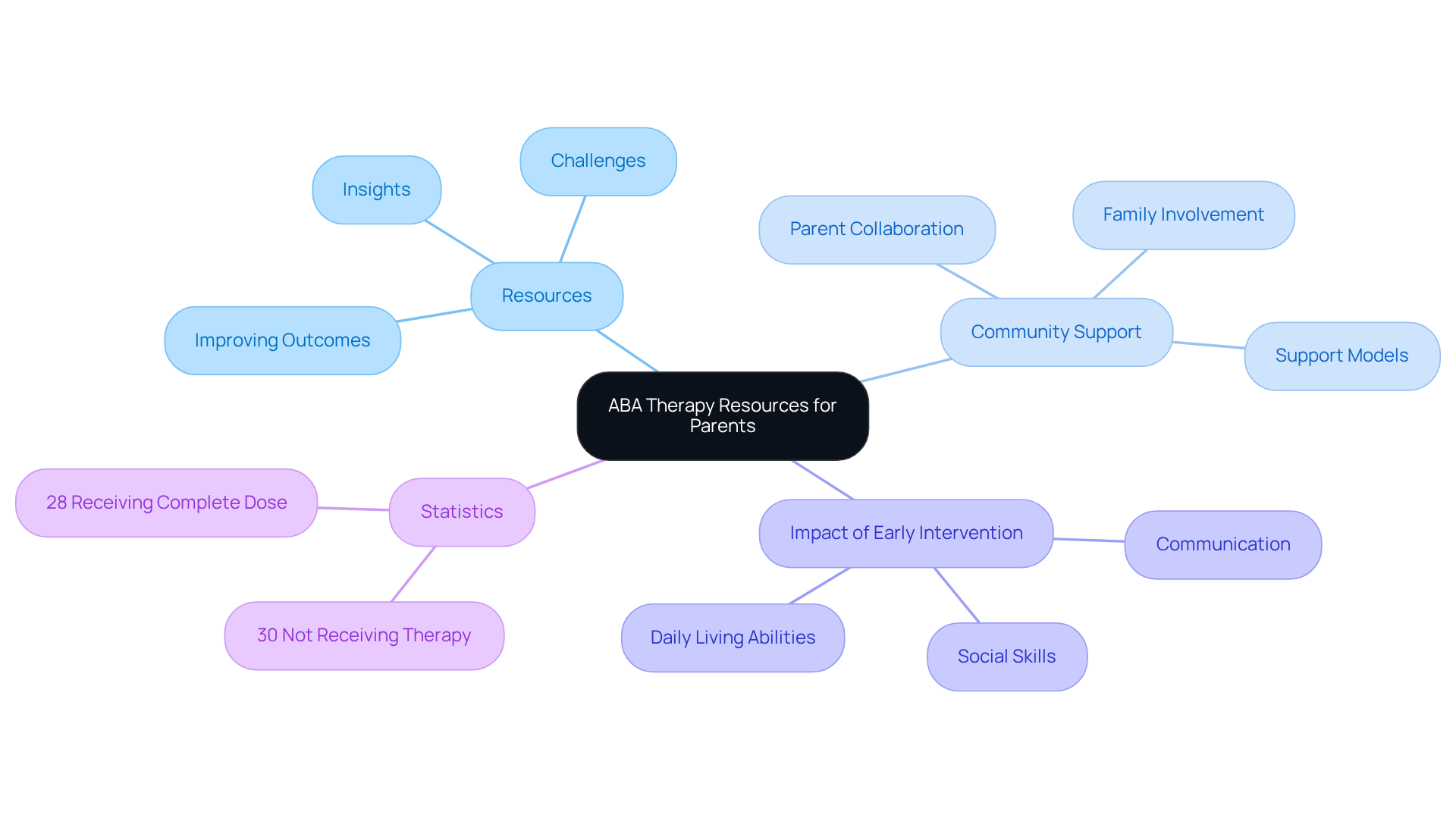
Children's Autism Program: Tailored Support Services in Texas
The Autism Program for Youth in Texas offers compassionate Applied Behavioral Analysis (ABA) services through local community agencies, thoughtfully designed to address the unique needs of individuals with autism. This program focuses on personalized support, which is essential for nurturing social, communication, and behavioral skills. Parents can explore various resources for autistic child, such as:
- Comprehensive evaluations
- Customized therapy sessions
- Family support
to ensure their children receive the holistic care that aligns with their specific needs.
With autism affecting approximately 1 in 36 youths in the U.S. and 1 in 51 eight-year-olds diagnosed with Autism Spectrum Disorder (ASD) in South Central Texas, this program plays a vital role in fulfilling the growing demand for effective support services. Experts emphasize the significance of individualized treatment plans, as these tailored approaches greatly enhance children's ability to flourish within their communities and improve their overall quality of life.
As part of the program, families are encouraged to maintain an attendance rate of 85 percent for scheduled treatments, with a maximum treatment duration of 720 hours. This structured approach ensures that children receive consistent support, fostering their development and well-being. Together, we can create a brighter future for our children, one step at a time.
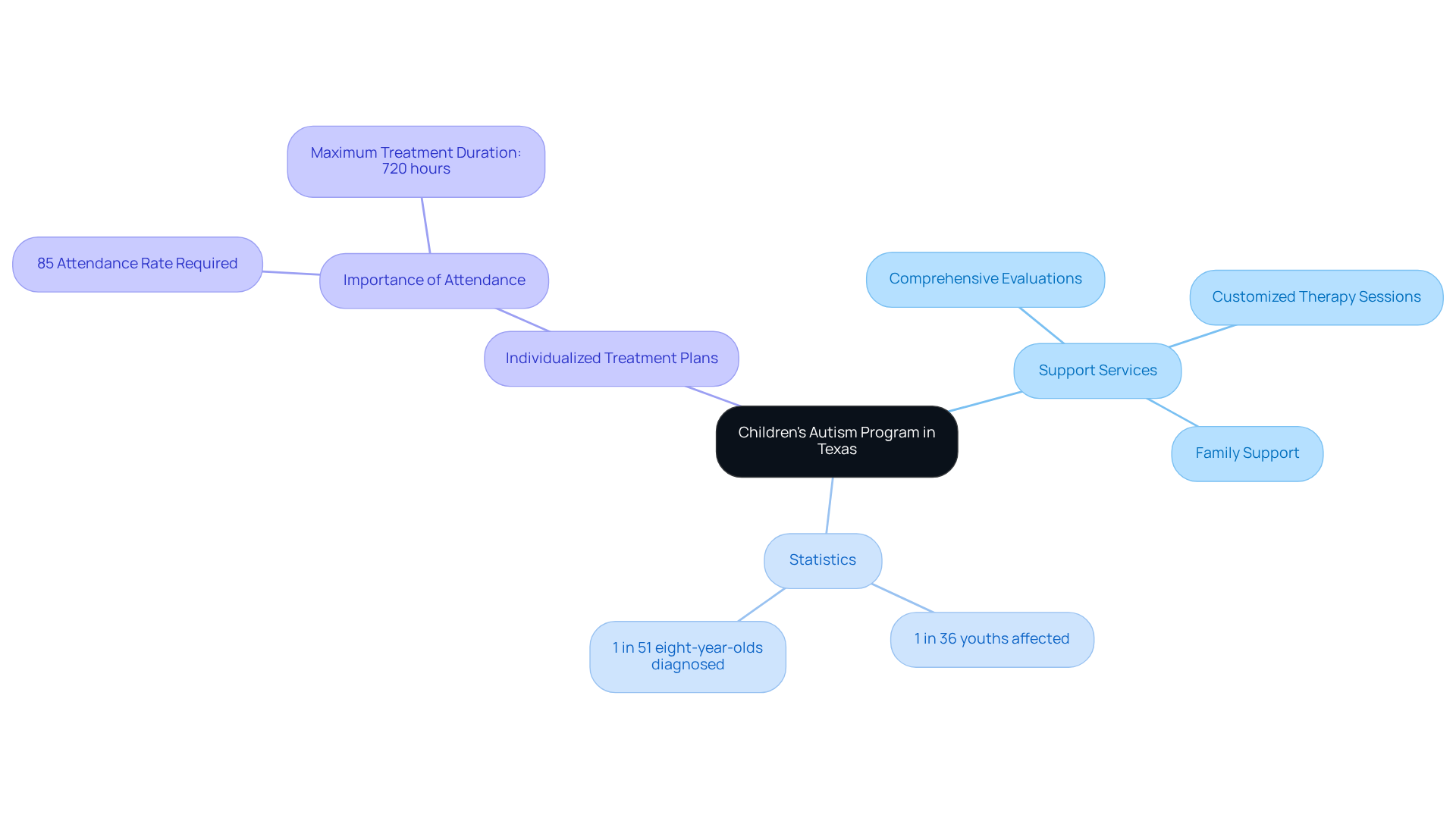
Social Skills Activities for Elementary Students with Autism: Engaging Strategies
Involving elementary students with autism in skills activities is essential for enhancing their interactions with peers and utilizing resources for autistic child. Techniques such as 'Emotion Charades' and 'Turn-Taking Games' create encouraging environments where children can practice interpersonal skills. Educators highlight that these activities not only make learning enjoyable but also help children grasp social cues and build meaningful friendships. One instructor shared, "Role-playing enables youngsters to explore various social scenarios in a safe space, which is vital for their development."
Group games and organized playdates further provide opportunities for practice, allowing children to develop crucial communication abilities in a fun and engaging manner. With approximately 1 in 36 children identified with developmental disorders, the need for effective social skills training cannot be overstated. Parents can implement these strategies at home by arranging regular playdates or incorporating role-playing games during family time, utilizing resources for autistic child to ensure their children have plenty of chances to practice and enhance their social skills.
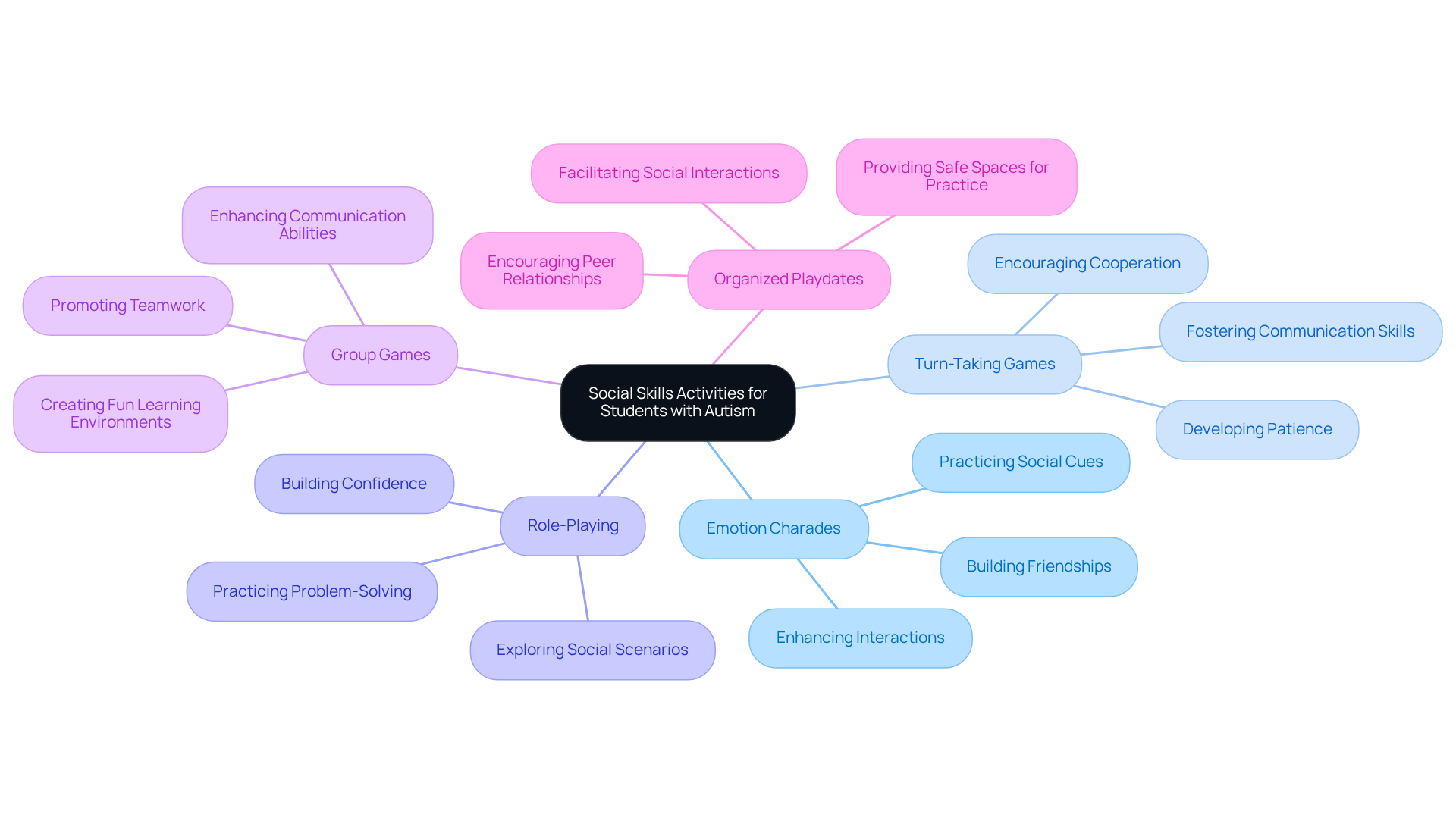
Understanding Autism: Key Insights for Parents from Sesame Workshop
Sesame Workshop provides a rich array of resources for autistic child that are designed to help parents understand autism. Their initiative, 'See Amazing in All Kids,' sheds light on the unique experiences of autistic youth, promoting acceptance and inclusivity. With 1 in 36 youths identified with autism, the importance of these resources is profound. Through engaging videos, informative articles, and interactive materials, parents can explore resources for autistic child in relatable terms. This approach not only facilitates meaningful conversations with their children about the condition but also deepens their understanding of its complexities.
Child development specialists, like Dr. Cathy Pratt, emphasize that resources for autistic child are essential in fostering a supportive environment. They empower parents to navigate their child's journey with confidence and compassion. Additionally, educational materials linked to programs such as 'See Amazing in All Children' have shown a positive effect on parents' attitudes and understanding of resources for autistic child. As parents engage with these resources, they gain insight into the emotional challenges their children may face, including heightened anxiety and depressive symptoms.
Exploring Sesame Workshop's resources for autistic child can significantly help families develop a deeper understanding of autism. By embracing these tools, parents can foster a nurturing atmosphere that encourages growth and acceptance. Together, let’s support our children on this journey, ensuring they feel seen and valued.
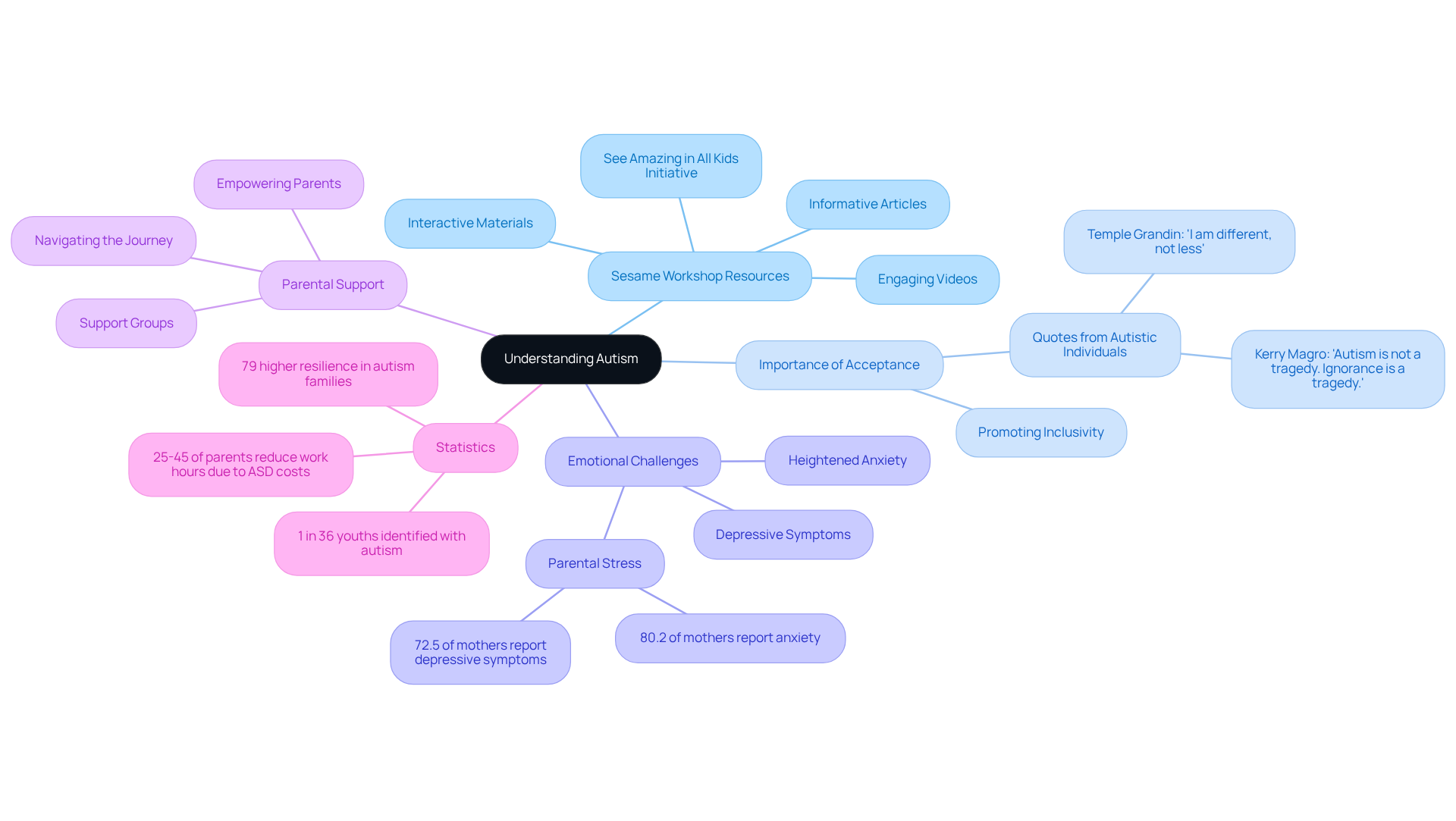
Sensory Equipment for Children with Autism: Essential Tools for Support
Sensory equipment is essential for supporting individuals with autism, offering tools that help manage sensory overload and improve focus. Items like weighted blankets, fidget toys, and noise-canceling headphones can create a calming environment, allowing young individuals to feel more secure and engaged in their activities. Have you noticed how certain tools can transform a stressful moment into a more manageable one?
Parents are encouraged to explore a variety of sensory products as resources for autistic children to find what best meets their child's unique needs. Each child is different, and discovering the right tools can make a significant difference in their daily experiences. Consider sharing your own experiences or questions in the comments; your insights could help others on a similar journey.
By investing time in understanding and selecting appropriate sensory equipment, you can create resources for autistic children that foster a nurturing atmosphere promoting well-being and connection. Together, let's explore the possibilities to enhance your child's comfort and engagement.
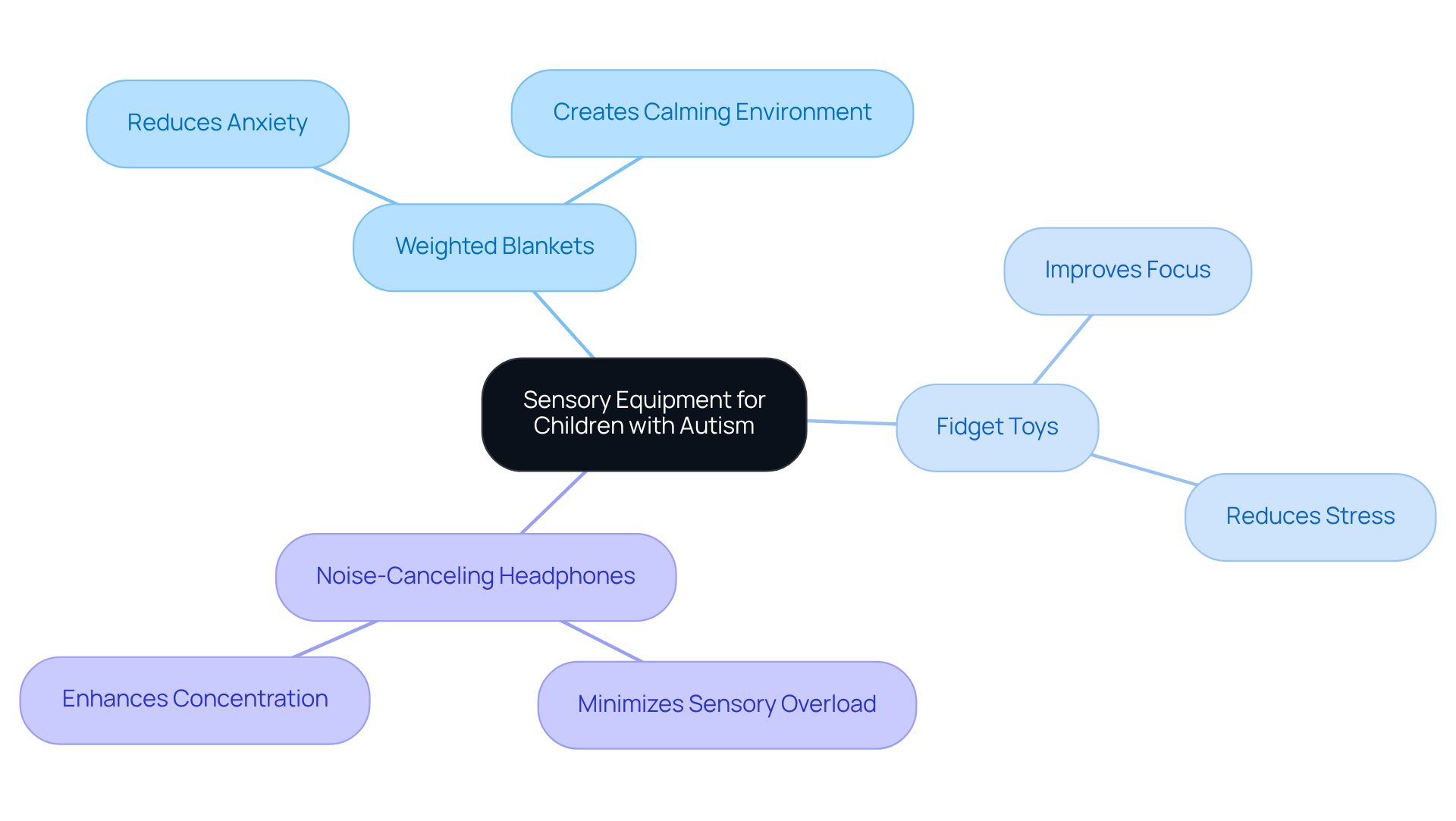
Early On® Michigan: Early Intervention Services for Young Children
Early On® Michigan stands as a vital statewide initiative, dedicated to providing early intervention services for infants and toddlers experiencing developmental delays, including autism. This program offers free assessments and organizes essential services aimed at assisting young individuals and their families. By addressing developmental needs promptly, families can access resources that nurture growth and learning, establishing a strong foundation for their children's future.
Numerous studies underscore the transformative power of early intervention. Research indicates that 50-75% of individuals benefiting from intensive Applied Behavior Analysis (ABA) therapy show significant progress. Developmental specialists highlight that early intervention is crucial for enhancing outcomes, as it not only mitigates developmental delays but also empowers families with the tools necessary for effective support.
In Michigan, early intervention saves an estimated $1.3 million per individual over their lifetime, showcasing the long-term financial benefits for families. Furthermore, communities that foster acceptance of individuals on the spectrum report 48% higher quality of life scores for autistic residents, illustrating the broader impact of these services.
More than 80% of families express an enhanced quality of life following early intervention programs, ultimately leading to improved well-being for both the youngsters and their families. If you are a parent or caregiver, consider reaching out to Early On® Michigan to explore the resources for autistic child that are available to you. Together, we can create a nurturing environment for our children to thrive.
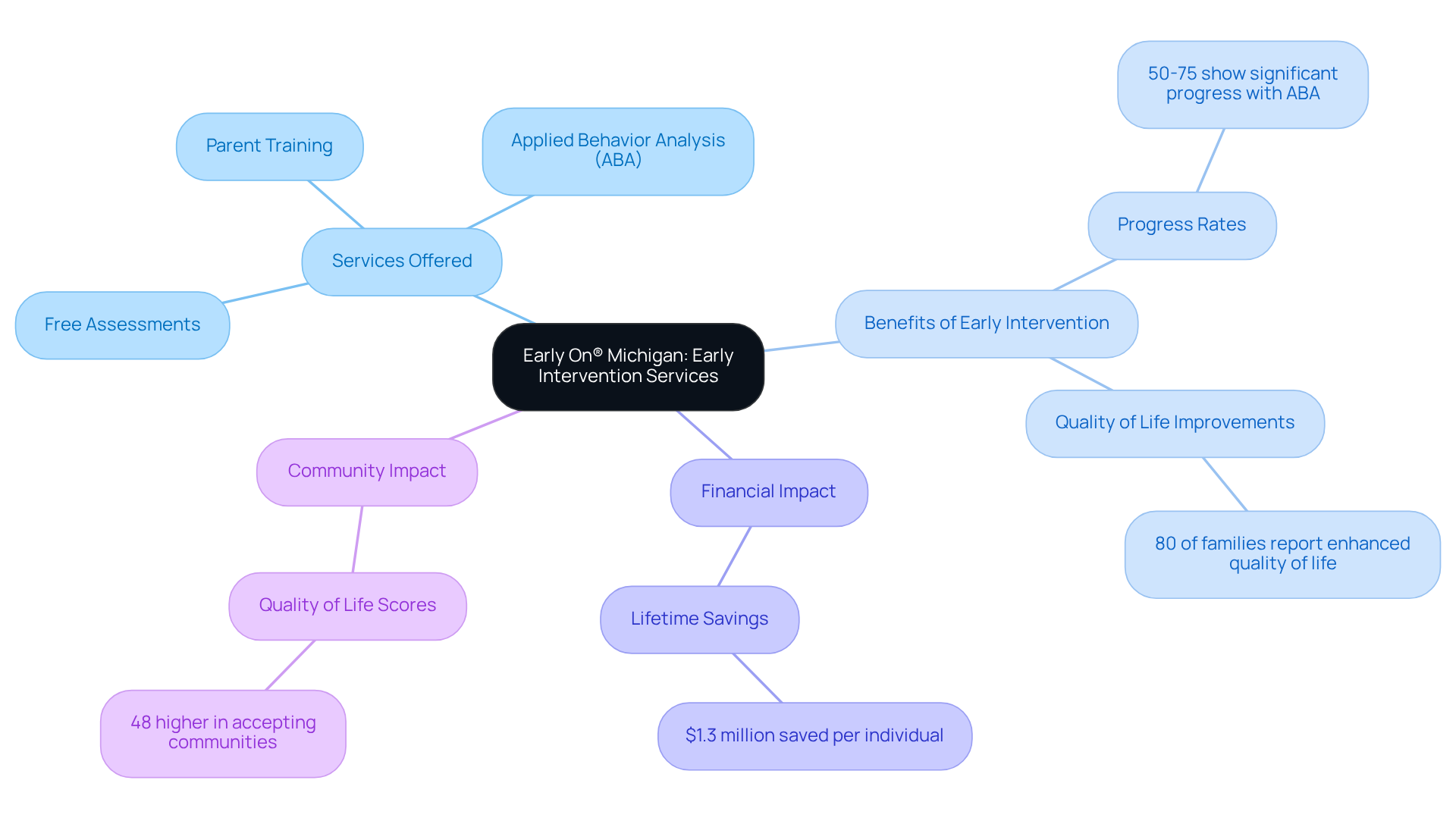
Helping Kids with Autism Make Friends: Practical Tips and Resources
Fostering connections for youth with autism requires thoughtful strategies and resources for autistic children that promote interaction and skill development. Parents can significantly enhance their children's social experiences by organizing playdates, which have proven beneficial for improving communication skills. Engaging young individuals in group activities not only cultivates friendships but also provides opportunities to practice social behaviors in a nurturing environment. Moreover, modeling appropriate social interactions is crucial; children learn by observing how adults navigate relational situations.
To further support young people in understanding social cues and expectations, resources for autistic children such as narrative accounts and visual aids can be invaluable. These resources help clarify community norms and enhance comprehension, making it easier for them to engage with their peers. As noted by youth psychologists, developing social skills is vital for forming meaningful friendships, as these abilities empower children to initiate conversations, share interests, and resolve conflicts effectively. By implementing these strategies, parents can create a supportive environment that encourages their children to forge lasting friendships.
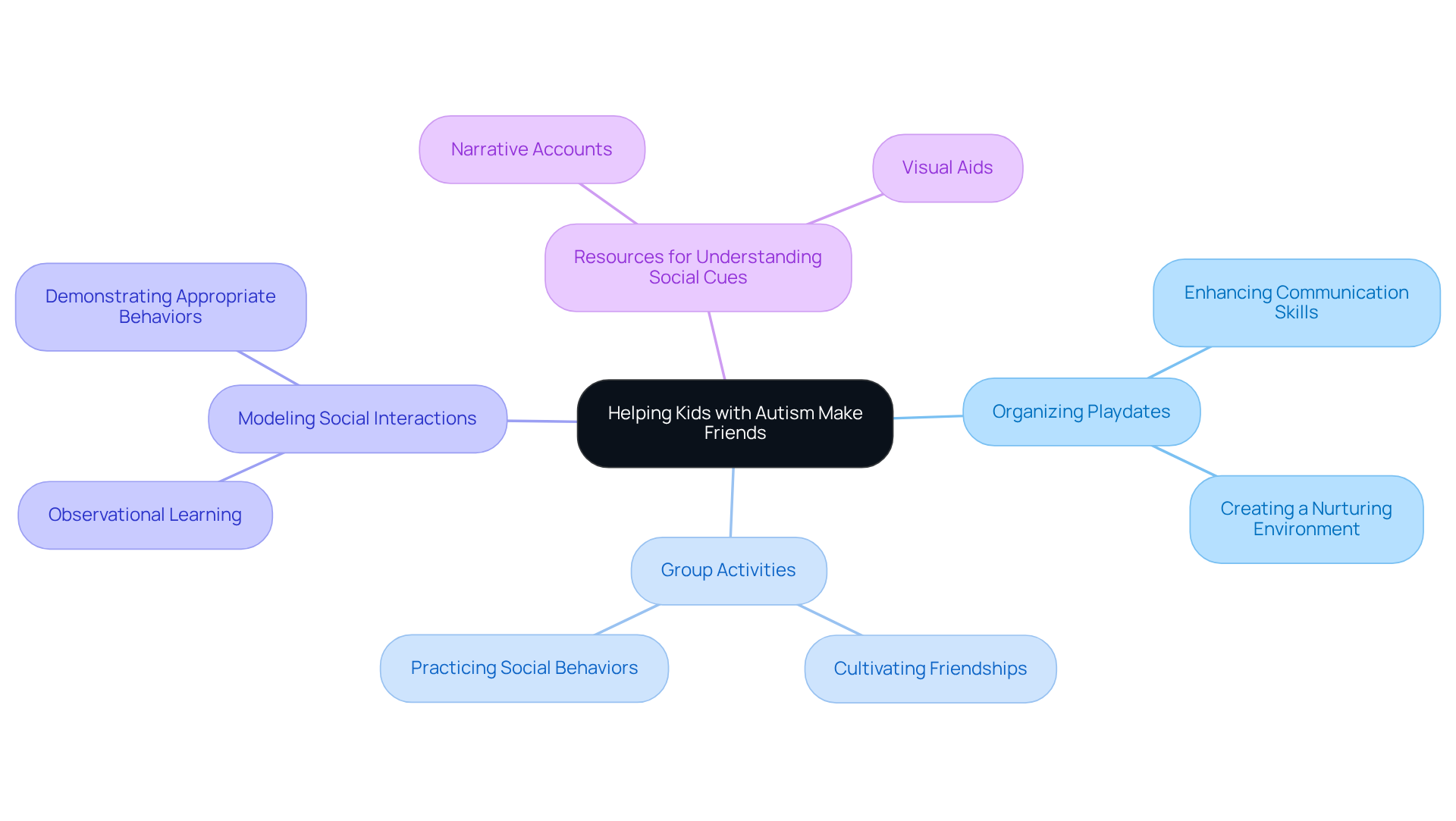
Online Courses for Educators: Empowering Strategies for Autism Support
Online courses for educators are vital in helping them develop effective strategies to support students facing developmental challenges. Programs like the Autism Internet Modules, along with resources for autistic children provided by organizations such as the Autism Society, equip teachers with essential insights into autism spectrum disorder, effective classroom management techniques, and individualized instruction methods. Research shows that well-trained educators can dramatically enhance educational outcomes for autistic students; for instance, the graduation rate for those receiving appropriate support is an impressive 74%. Furthermore, 73.6% of autistic students in special education successfully graduate with a high school diploma, highlighting the critical need for effective training.
With 166,041 autistic pupils currently enrolled in schools across England, the urgency for comprehensive educator training has never been greater. By enhancing their skills through these training programs, educators can cultivate inclusive learning environments that address the diverse needs of their students, ultimately leading to improved academic and social outcomes. Many educators express that these online courses have positively influenced their teaching effectiveness by equipping them with resources for autistic children that foster engagement and learning.
Quotes from educators emphasize the tangible benefits of these strategies, reinforcing the importance of ongoing professional development in this essential area. As we consider the impact of these training programs, it becomes clear that investing in educator training is not just beneficial—it's imperative for nurturing the potential of every student.
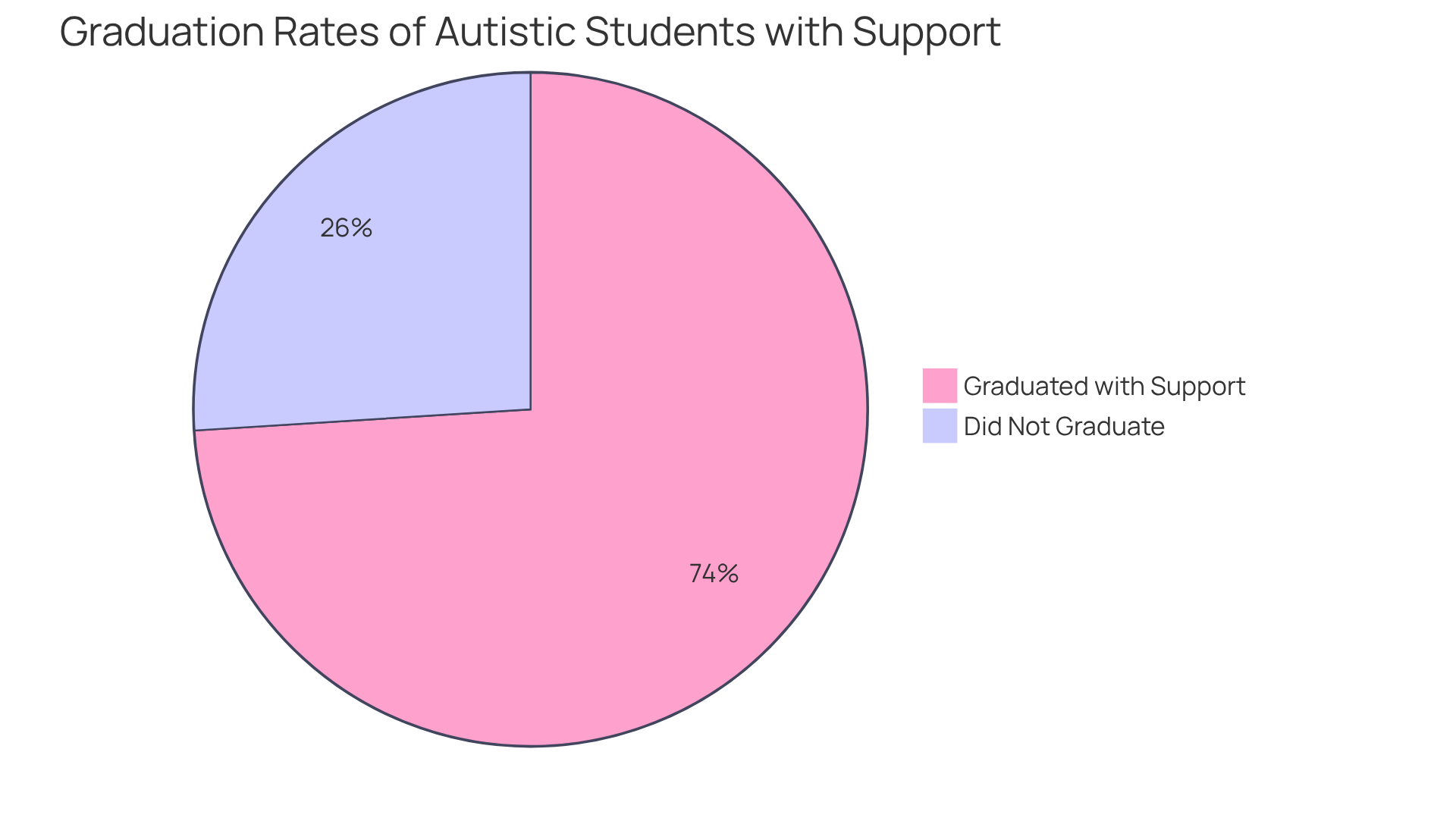
Getting Started: Introducing Your Child to Their Autism Diagnosis
Introducing your child to their developmental diagnosis is a sensitive yet essential conversation. It’s important to approach this discussion with both sensitivity and positivity. As parents, emphasizing your child's strengths while acknowledging the unique challenges they may face is vital. For example, autism is diagnosed 3.8 times more in boys than in girls, which highlights the need for tailored discussions based on gender differences.
Utilizing resources for autistic child, such as social stories, can significantly enhance a young person's understanding of their diagnosis by presenting information in a relatable and supportive manner. These narratives not only promote acceptance but also inspire self-advocacy, enabling young individuals to embrace their identity. Child psychologists recommend using age-appropriate language and examples to facilitate open dialogue, ensuring that children feel safe and understood.
As Dr. Temple Grandin states, "I am different, not less," reinforcing the importance of embracing differences. Additionally, providing resources for autistic child, including books and visual aids, can further assist in making this conversation constructive and affirming. For instance, consider reading 'All Cats Have Asperger Syndrome' by Kathy Hoopmann, which offers a gentle introduction to the condition through relatable stories. This approach not only fosters understanding but also creates a supportive environment for your child to explore their identity.
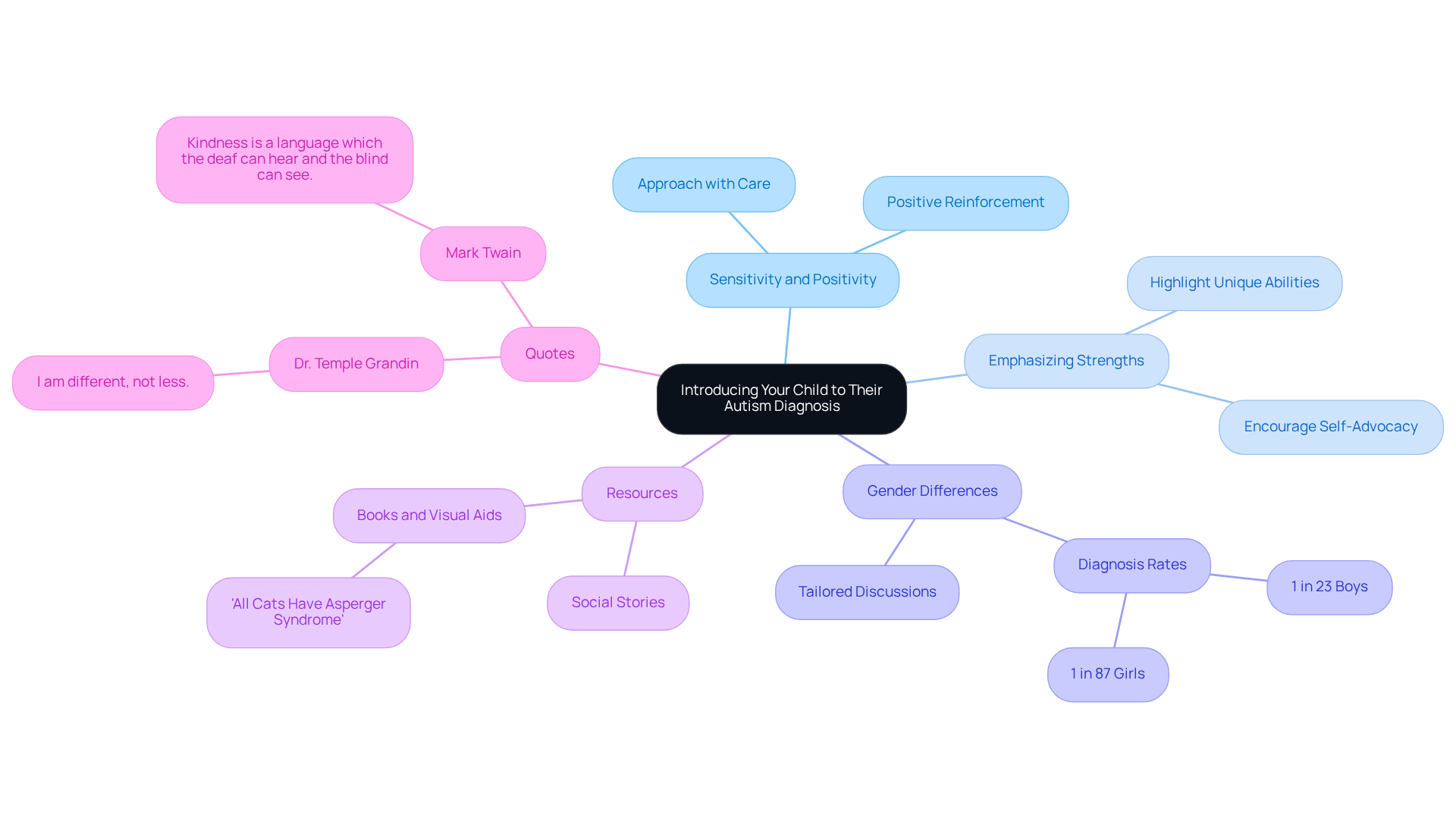
Find Help Near You: Local Resources for Autism Support
Accessing local resources for autistic child developmental assistance is crucial for families in need of immediate help. Organizations like Autism Speaks and the Autism Society offer extensive directories that guide families to vital resources for autistic child services in their area, including therapy options and educational support. Local health agencies and community centers also play a key role by providing information on assistance groups and specialized services tailored to the unique needs of young individuals with developmental disorders.
As highlighted by the Centers for Disease Control and Prevention, approximately 1 in 36 children in the U.S. has been identified with a developmental disorder as of 2023. This statistic underscores the growing demand for accessible assistance. Community organizations significantly enhance the availability of resources for autistic child, thereby creating a supportive environment for families navigating the complexities of autism care.
As the population of autistic individuals continues to expand, the importance of localized support becomes even more pronounced. It ensures that families can find the help they need when they need it most. For ongoing updates and resources, consider subscribing to ASD Media's newsletter. Your journey toward support and understanding is just a click away.
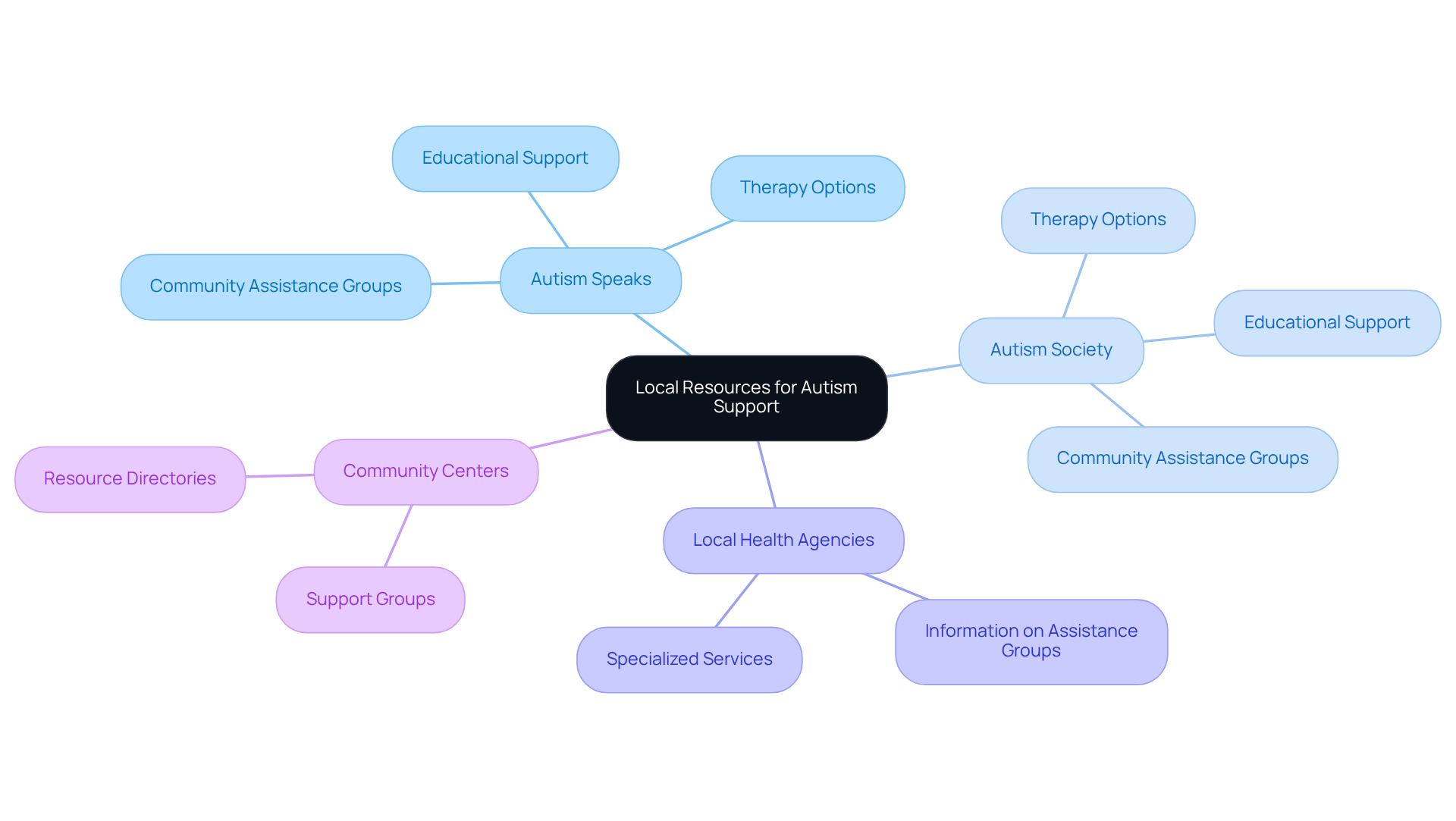
Conclusion
Supporting children with autism is a journey filled with complexities, necessitating a comprehensive approach that weaves together education, community involvement, and tailored resources. By harnessing essential tools and strategies, parents and caregivers can cultivate a nurturing environment that not only fosters development but also enhances the quality of life for their children.
In this article, we have underscored the vital role of:
- Early intervention
- Community support
- The availability of tailored resources
Understanding autism through initiatives like Sesame Workshop, utilizing sensory equipment, and engaging in social skills activities are all crucial steps in meeting the unique needs of autistic children. Programs such as Early On® Michigan and local autism support services further highlight the importance of accessible help, ensuring that families can find the assistance they require.
Ultimately, creating an inclusive and supportive environment for autistic children benefits not just the individuals but also strengthens the fabric of our communities. By advocating for awareness, making use of available resources, and fostering connections, every parent and educator can play a part in shaping a brighter future for children with autism. Let us continue to champion these essential resources and support systems, ensuring that every child has the opportunity to thrive and reach their full potential.
Frequently Asked Questions
What is ASD Media and its purpose?
ASD Media is dedicated to enhancing the implementation of Applied Behavior Analysis (ABA) therapy by providing comprehensive resources for parents and professionals of autistic children. It aims to improve outcomes for children with autism and ADHD through valuable insights and community support.
Why is early intervention with ABA therapy important?
Recent studies suggest that early intervention with ABA therapy can lead to significant improvements in communication, social skills, and daily living abilities, especially when therapy is started at a young age.
How does community involvement impact ABA therapy outcomes?
Community involvement is crucial for the success of ABA therapy. Families who interact with each other often report better outcomes, and children with married parents have a higher chance of continuing ABA services, indicating the importance of family support.
What role does collaboration play in effective ABA therapy?
Collaboration among parents, therapists, and educators enhances the effectiveness of interventions. Customization in therapy is essential for individuals on the spectrum, leading to positive results and a supportive atmosphere.
What percentage of youth with ASD do not receive therapeutic services?
Approximately 30% of youth with ASD do not receive any therapeutic services, highlighting the need for community assistance to ensure access to ABA therapy.
What is the Autism Program for Youth in Texas?
The Autism Program for Youth in Texas offers compassionate ABA services tailored to the unique needs of individuals with autism, focusing on personalized support to nurture social, communication, and behavioral skills.
What resources are available for parents in the Autism Program?
Parents can access resources such as comprehensive evaluations, customized therapy sessions, and family support to ensure their children receive holistic care.
What is the recommended attendance rate for families in the Autism Program?
Families are encouraged to maintain an attendance rate of 85 percent for scheduled treatments, with a maximum treatment duration of 720 hours, to provide consistent support for their children.
What social skills activities can be beneficial for elementary students with autism?
Activities like 'Emotion Charades' and 'Turn-Taking Games' help enhance interactions and build social skills. Role-playing and organized playdates also provide opportunities for children to practice communication abilities.
How can parents implement social skills training at home?
Parents can arrange regular playdates and incorporate role-playing games during family time, utilizing resources for autistic children to give them ample chances to practice and improve their social skills.




